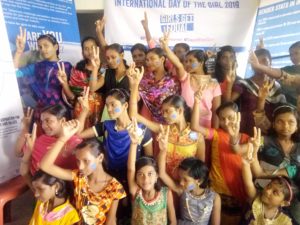Employment Opportunities and Scope for Skill Development
~ Swati Das
The “HSBC- Skill for Life” Programme of CYSD aimed at offering employment opportunities to the unemployment youth was succeeded in giving placement to 70% of the trainees out of 223 in Retail Sectors like Shopping Malls, Boutiques, Warehouses, etc. as per the envisaged target. During 2016, the programme was launched with the support of Swadesh Foundation.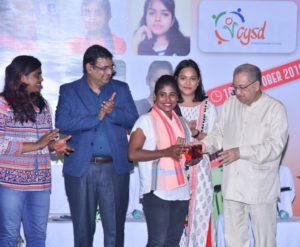
The most challenging part of the project was to pick the candidates from different slums of Bhubaneswar city; and the role of CRPs (Community Resource Persons) during this phase was critical, who helped us find the potential candidates and organize meetings at slums. The Skill for Life Training was conducted for 6 batches at CYSD-DRTC, having a duration of 2 months for each batch, with the value-added module like IT, Spoken English along with Life Skill in order to make the trainees as assets for the retail sector. After successful completion of the training, they were placed in different retail sectors.
In meanwhile, the idea of organizing an Alumni Meet was evolved from both the ends of professional and social with the aim to build a bridge between the experience and its utilization as a lesson for the future in general and to bring out developmental ideas from the past experiences in particular.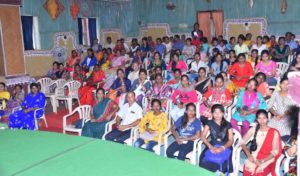
On 16 Oct, 2019, the idea took a complete shape and organization of the Alumni Meet turned into reality with a Panel Conversation titling “Employment Opportunities and Scope for Skill Development”. The distinguished panelists present in the discussion were Shri Jagadananda, Mentor, CYSD; Dr. Hara Prasanna Das, MAK Group of Institutions; Ms. Sanjogita Mishra, TATA Strive; and Mr. Ajit Kumar Mallik, MAX. The panel discussion was facilitated by Mr. Santosh Mishra, Human Context.
Appreciating the Alumni on their success towards getting fair employment, Shri Jagadananda inspired the new trainees emphasizing on the idea of learning from the experiences of Alumni to further succeed in their career path. Dr. Hara Prasanna Das focused mainly on the idea of ABC – Anger, Blaming and Complaint, and expected that the trainees would control these three things to excel in life.
Ms. Sanjogita Mishra warmed the environment with her innovative idea of recognizing the talents and skills within self and to further develop it. She also emphasized to acquire adequate knowledge on Schemes of Skill India and to opt for those. Mr. Ajit Kumar Mallik made the gathering understand the scope and importance of Retail Sector in cities like Bhubaneswar & Cuttack and encouraged the freshers to participate in the schemes and programme of Skill India.
The Panel Conversation was followed by sharing of the Journey by the Alumni. Undoubtedly, sharing of life
journey experience is a powerful social strategy required to create an environment of learning for the upcoming generation. The alumni shared their experience and journey of life before receiving ‘Skill for Life’ training and life now.
Alumni Speak
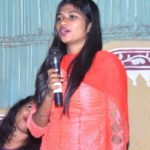
“Skills for Life Training gave me courage and support to come out of the traditional thinking of society. Now, I am working in BSNL Call Centre with a monthly salary of Rs. 10,000/- and living a comfortable life with my family which I had never imagined. Not only I am supporting my family but also standing as an example for other women who never give up against bad conditions, said Roji Nayak, a 20 years old girl from Salia Sahi Slum of Bhubaneswar.
“I am enjoying a happy life by working in a Boutique and earning Rs. 12,000/-per month. No more I am shy of observing any festival without new clothes and sweets. I have gained respect in the eyes of my community people”, said Sabitri, a 21 years old girl, in smiling face. Moreover, I have proved that where there’s a will there’s a way. The training could give me a hope of earning and living with dignity, she shared.
 “Now, I am one of the pillars of my family. I can fulfill my brother’s dream of having new shoes, and can see my father with new clothes in festivals. I have proved myself independent being in the retail sector”, said Mamata Panda, a 24 years young girl from Bhubaneswar slum. “My family was having poor financial condition once upon a time, now I am earning a salary Rs.17,000/- per month by working at Brand Factory (a Shopping Mall in Bhubaneswar)”, she added.
“Now, I am one of the pillars of my family. I can fulfill my brother’s dream of having new shoes, and can see my father with new clothes in festivals. I have proved myself independent being in the retail sector”, said Mamata Panda, a 24 years young girl from Bhubaneswar slum. “My family was having poor financial condition once upon a time, now I am earning a salary Rs.17,000/- per month by working at Brand Factory (a Shopping Mall in Bhubaneswar)”, she added.
Congratulating the Alumni on their achievements, Ms. Swati Tomar, Sr. Representative of Swadesh Foundation present on the dais, threw some light on the initiatives of HSBC Skill and Swadesh Foundation towards creating employment opportunities for the poor and unemployed section
of the society. She also extended her heartfelt appreciation to CYSD for achieving the target and involving maximum women in the training.
The community leaders, community resource persons, and the Alumni were felicitated for their contribution towards the success of the project and achievements.
Giving the valedictory address, the Chairman of CYSD, Shri P. K. Sahoo motivated the youth assembled citing a few examples of ancient disciples who had worked hard and continued their efforts for getting a success.

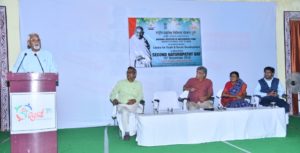
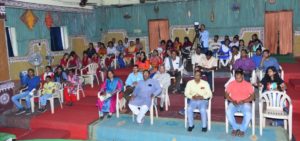
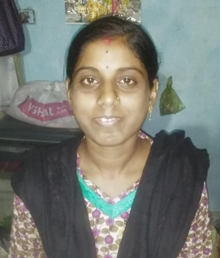
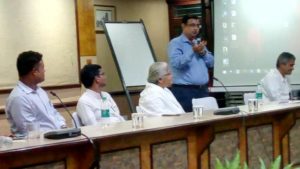
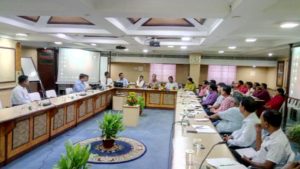
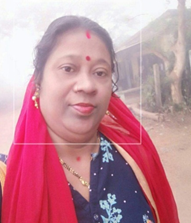
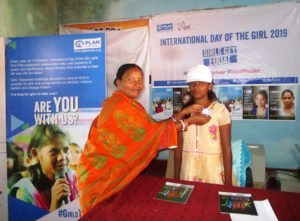 Girl Child leaders from different villages came forward to celebrate the event at their respective panchayats. The PRI members also felt very happy and helped the girls celebrate this event at each Panchayat meeting hall with the facilitation of CYSD program team members. The PRI members, parents, and girls put banners and standees depicting slogan `Girls Get Equal’ and encouraged girl child leaders to take over the responsibility of Gram Panchayat. After sharing the key objectives of the event, respective GP Sarpanch declared the girl child leader’s name (chosen by girls) to take over the chair of Sarapanch with a warm welcome (offering a cap and badge). The PRI leaders also urged the girl child leaders to start proceeding with their function as Sarpanch of the GP.
Girl Child leaders from different villages came forward to celebrate the event at their respective panchayats. The PRI members also felt very happy and helped the girls celebrate this event at each Panchayat meeting hall with the facilitation of CYSD program team members. The PRI members, parents, and girls put banners and standees depicting slogan `Girls Get Equal’ and encouraged girl child leaders to take over the responsibility of Gram Panchayat. After sharing the key objectives of the event, respective GP Sarpanch declared the girl child leader’s name (chosen by girls) to take over the chair of Sarapanch with a warm welcome (offering a cap and badge). The PRI leaders also urged the girl child leaders to start proceeding with their function as Sarpanch of the GP. 